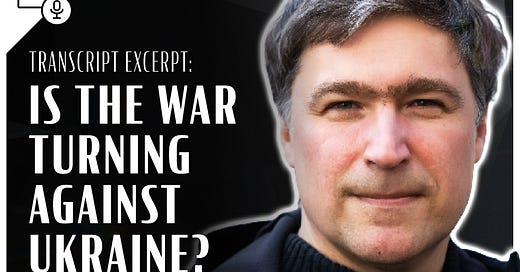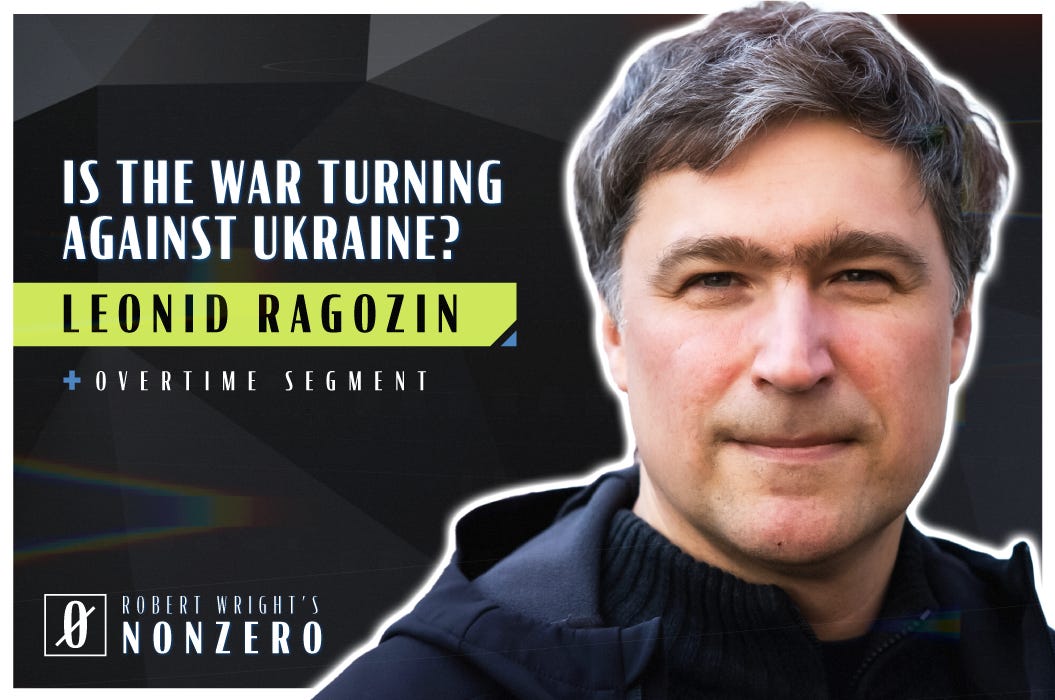Transcript Excerpt: Leonid Ragozin
Taken from Robert Wright’s conversation with journalist Leonid Ragozin.
Bob: What is your take on what's going on in the Ukrainian government? What people say is, “Well, the Ukrainian people overwhelmingly support continuing to fight.” And I think that's true. On the other hand, the government has influence here. The media is fairly tightly controlled by the government—as is not uncommon during wartime, maybe, but certainly much more tightly than in the West. If they wanted to, they could start recalibrating expectations about how optimistic Ukrainians should be. In other words, lay it out: “We're not going to get Crimea, let's face it.” I mean, move them toward that perception, you know?
And so the government has influence. It also has influence in terms of just what it says. You know, the president can say, “Look, frankly, the Donbass can only be regained at very considerable human cost. And we need to have a conversation about [it]…” and so on. The government is not powerless when it comes to shaping popular sentiment, but so far as I can tell, the government is not inclined to reshape expectations.
Do you—I mean, first of all, you may disagree with me. But if you don't, do you have an explanation for this?
Leonid: Right. Yeah, it's there. It's the very right question to ask. And there is no simple answer. One background issue is that I wouldn't really rely on the polls in Ukraine in the same way as I wouldn't rely on polls in Russia. There is a lot of pressure and falsification going on because, really, in contemporary Ukraine, you cannot say openly that you want the war to stop, whatever the conditions are for the end of the war. Because there will be public condemnation, but also because the security agencies are looking for such people. And if you go through the timeline, you will see how many people the SBU—the security service in Ukraine—are prosecuting for their posts online. In the same way as the Russians do with people who criticize Putin's aggression in Ukraine or criticize the actions of the Russian army and torture and killings in Ukraine.
So, there is one very interesting character called Alexey Arestovych, who used to be one of the main talking-heads in Ukraine—official talking heads—as part of Zelensky’s administration. Definitely the most influential of the talking heads until he resigned from his position.
Bob: Now, is he the one who made the mistake of saying that some Ukrainians killed by a missile had actually been killed by an errant Ukrainian missile? Or is that a different guy?
Leonid: Not sure about that. That could [have happened]. I don’t know.
Bob: Okay.
Leonid: Arestovych is mostly famous for some of their very accurate forecasts, including predicting this war, this full-out invasion, and the nature of this full-out invasion some two or three years before it actually happened. And he made quite a few interesting and accurate forecasts in the beginning of the war. He said a lot of things that didn't happen as well. And his main function when he was the government spokesman officially is creating those expectations that many will now argue have been excessively optimistic about the outcome of the counteroffensive and previous offensives that Ukraine waged.
So, back in March, when negotiations were going on and Arestovych himself was officially optimistic about those negotiations, he thought—at least publicly—that they will result in Russia withdrawing troops, at least to the line of the 23rd of February 2022. At that point, he said in an interview that anything less than that will be defeat for Ukraine. Anything less than the return to the status quo in 2022 will be defeat for Ukraine. So, that really defines the thinking in Ukraine. They will not admit it officially, but that defines the thinking in Ukraine. That, if you don't get anything that brings Ukraine into a more advantageous situation than it was in on the 23rd of February 2022, then why did not we accept the Minsk agreements—even in their harshest reading—as proposed by the Russians?
Because if they accepted the Minsk agreements back at the time, then there would be this autonomy effectively controlled by Russia in the east of Ukraine, that will be similar to South Ossetia or Abkhazia, Georgia or Transnistria in Moldova. It wouldn't be comfortable for Ukraine. It would certainly prevent Ukraine from entering NATO and probably the European Union as well. But this war wouldn't have happened.
Bob: So, you're saying if they had accepted the Minsk agreements back then—when was it? You know, because for one thing, a lot of people in the West insist that Russia was the one that didn't follow through on the Minsk agreements. It sounds like you're suggesting that, actually, Ukraine could have had the Minsk agreements. And when was the critical period when they failed to seize that opportunity?
Leonid: It is my personal opinion, but I think the opportunity existed all the way until February 23rd. Mind you, when you look into the leaks and statements regarding the negotiations that were held after the start of the full-out invasion—Bennett's mediation and Schröder's mediation and Erdogan's mediation—again, what was discussed then was not terribly dissimilar to the Minsk agreements. And at that point, just to remind you, Russia had not yet seized Mariupol, for example.




